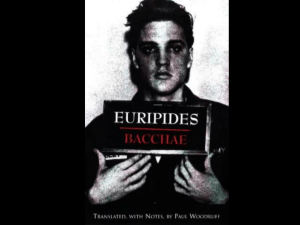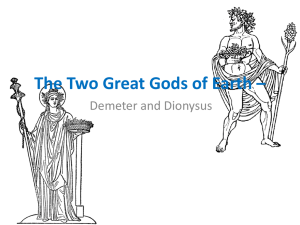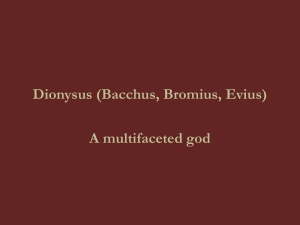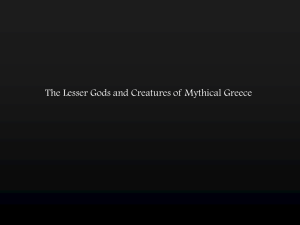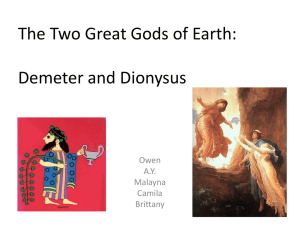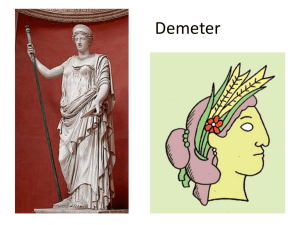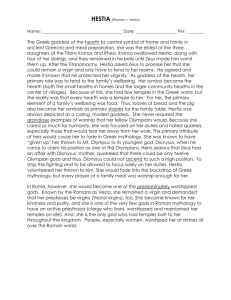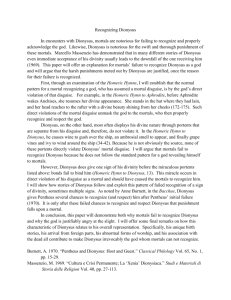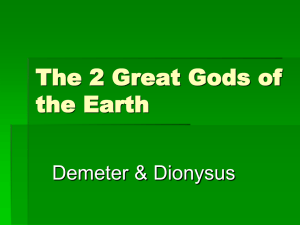The_Ecstatic_Dance_of_Apollo_and_Dionysus_files
advertisement
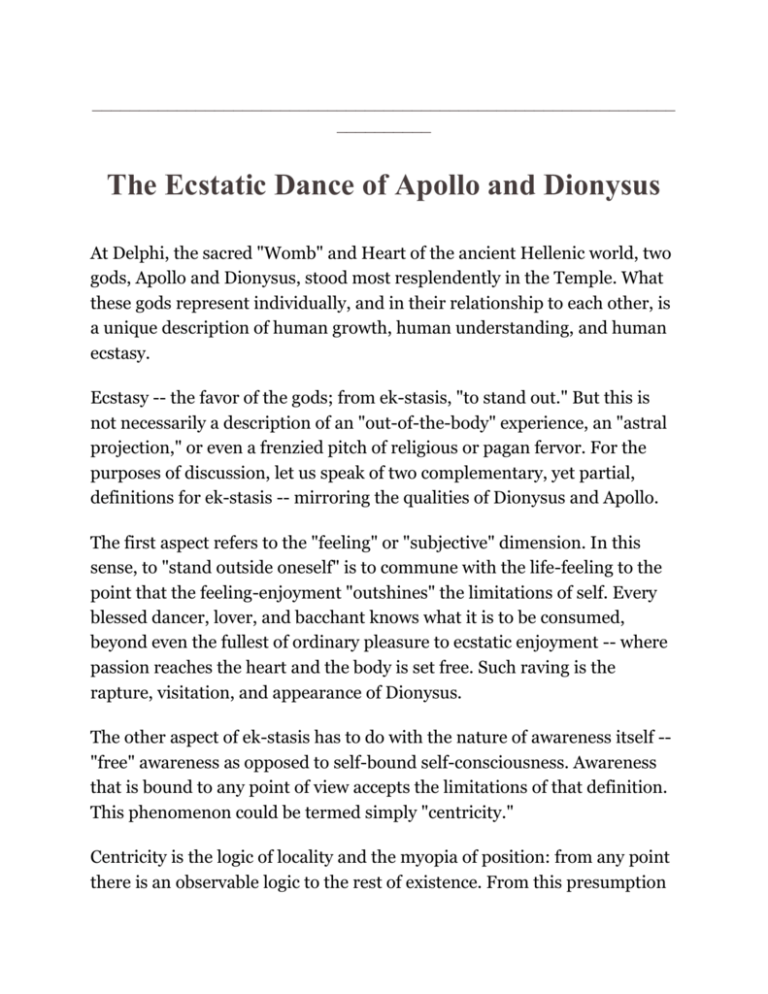
______________________________________________________________ __________ The Ecstatic Dance of Apollo and Dionysus At Delphi, the sacred "Womb" and Heart of the ancient Hellenic world, two gods, Apollo and Dionysus, stood most resplendently in the Temple. What these gods represent individually, and in their relationship to each other, is a unique description of human growth, human understanding, and human ecstasy. Ecstasy -- the favor of the gods; from ek-stasis, "to stand out." But this is not necessarily a description of an "out-of-the-body" experience, an "astral projection," or even a frenzied pitch of religious or pagan fervor. For the purposes of discussion, let us speak of two complementary, yet partial, definitions for ek-stasis -- mirroring the qualities of Dionysus and Apollo. The first aspect refers to the "feeling" or "subjective" dimension. In this sense, to "stand outside oneself" is to commune with the life-feeling to the point that the feeling-enjoyment "outshines" the limitations of self. Every blessed dancer, lover, and bacchant knows what it is to be consumed, beyond even the fullest of ordinary pleasure to ecstatic enjoyment -- where passion reaches the heart and the body is set free. Such raving is the rapture, visitation, and appearance of Dionysus. The other aspect of ek-stasis has to do with the nature of awareness itself -"free" awareness as opposed to self-bound self-consciousness. Awareness that is bound to any point of view accepts the limitations of that definition. This phenomenon could be termed simply "centricity." Centricity is the logic of locality and the myopia of position: from any point there is an observable logic to the rest of existence. From this presumption of position arises prideful hybris and the arrogance of power. Thus, it is also said that we are philosophers of our adaptation. But we cannot accept any logic as truth unless the prison of centricity is ecstatically transcended, "stepped beyond" -- shot with arrows or blended into the kosmos harmonia. Such is the appearance of the god Apollo with his stringed instruments, the lyre and bow. Ek-stasy, like Apollo's golden lyre and silver bow and arrows, is the transcendence of centricity, "ego-centricity" in particular; but the transcendence of centricity also has a social history. The geocentric-to-heliocentric change beginning in the Renaissance marked a new culture. For Westerners, the understanding and transcendence of the cultism of Christianity, Eurocentricity, and mental/male centricity likewise marks a new age in history, but that is for a later discussion. For now let us just say that Apollonian ecstasy bears the free awareness that steps beyond centricity. While ecstasy could be called a form of self-transcendence, it is not selfdenial. In fact, the foundation for self-transcendence is a strong self. Like the eye above the foundational pyramid of self, ecstasy is the free awareness that stands upon (and beyond) definitions and limitations. Ecstasy is not something to be sought because of a bad or incomplete self-feeling. Rather than denying self, we simply locate ourselves in a process of growth that includes self, and accept any ordeal that this process requires. Self is not to be denied, but rather harmonically cultivated and then ecstatically understood. Likewise socially, each cult must locate itself in the same process of growth wherein the limits that create self-definition are exceeded and culture is created. Ecstasy is an ancient Western word for the state and stage of life that no longer presumes the limits imposed by body, mind, self, and culture -- even as it fully includes and embraces them. Sharing his or her enjoyment of what is limitless, an ecstatic naturally points out the limitations of the cult and culture from which he or she arose. No wonder the ancient Hellenic word for "witness" was martyr, a word-form that has remained essentially unchanged after thirty centuries. Such is a partial description of ecstasy. Descriptions of expanded awareness and deep enjoyment of the divine nature of life are to be found in the heart of every culture. This growth process is described in countless cosmologies, and is archetypically portrayed in Western history in the dynamism of Dionysus and Apollo, the classic dyad of free feeling and harmonic wisdom. Let us first focus on the elder Apollo, god from the Northeast (meaning India), god of intellect, wisdom, and foresight. The name Apollo intimates an understanding of his divinity. It has been suggested that its root is found in "a-polla," meaning "not of many." This would make sense since Apollo's cosmological function (with his bow and lyre) is that of harmonic penetration. Apollo sees the source brightness (the father day-brightness, Zeus) in every different thing, and also sees that the brightness is singular, or "not of many." It has also been similarly suggested with equal persuasion that the word Apollo comes from apellei, "gathering." This likewise rings true, as Apollo is the god of logos, the gathering of what has been set apart. Logos is to speak, to understand, to harmonically gather. It was Apollo who led the Muses and consumed the Sibyl, the Seer, and the Pythia at Delphi. To realize or be visited by Apollo is to see and feel the divine creative Source gathered from every different thing, and let logos speak its truth. "The Wise is One Only. It is willing and unwilling to be called by the name 'Zeus.' If you have not heard me by all of this but Logos, then I can say: All is One." The words of Herakleitos echo across millennia. And a deeper memory of the divinity can be heard in the ancient Orphics (preceding philosophia), chanting Apollo's hymn, ZEUS EVERYWHERE-ZEUS EVERYWHERE-ZEUS EVERYWHERE. Zeus the first, Zeus of the flashing lightning bolt the last; Zeus the head, Zeus the middle, from Zeus have all things been made. Zeus is the foundation of the earth and of the starry heaven; Zeus was male, Zeus was the immortal bride; Zeus the breath of all things, Zeus the rush of the flame unwearied; Zeus the source of the sea, Zeus the sun and moon; Zeus the king, Zeus of the flashing lightning, the beginning of all things. For he concealed all and again brought them forth from his sacred heart to the glad light, working wondrous things. ZEUS EVERYWHERE-ZEUS EVERYWHERE-ZEUS EVERYWHERE. Apollo, the divine son, is a discriminative insistence of the One great god, Zeus (the father-part of Apollo's own flesh), the supreme being. This insight is a penetrating one: Apollo's arrows are identical to the penetrating insight -- divine, but not supremely so. The singular Brightness is supreme and begat not only insightful Apollo, but all things. The Homeric Hymn to Apollo tells how the new-born god's very first action was to throw off his swaddling clothes and proclaim to the gods who had gathered, "Please give me my beloved Lyre and Bow; I'll cast prophecy to men, and make them know Zeus's perfect counsel." Both the lyre and the bow depend on tension and release, the setting apart and the coming together, releasing beauty in the paradox of opposites. This single principle is described at the dawn of philosophy by Herakleitos as "a fitting together turned back on itself" in which "that which is drawn apart becomes one with itself as in the bow and lyre . . . Out of all things comes a unity, and out of a unity all things." Let it be noted that in these instances, Herakleitos was restating common Orphic sayings. Apollo's penetrating intelligence makes him the god of harmonic wisdom. He represents the truth of philosophical endeavors, and is equally abundant in the poetic and musical arts as the leader of the Muses. He is seen with the silver bow and arrow, symbolizing the penetration of insight, and also with the golden lyre, which expresses the one harmony between different tones. At Delos this god of wisdom stood gigantic in statuary repose, with the bow in his left hand and the Charites or Graces in his right hand, signifying, it was said, the seniority of graciousness over sharpness when the being is at rest. (And thus it was that his lyre was golden and his bow silver.) Apollo shared the temple at Delphi with his resonant complement and younger half-brother Dionysus, commonly known as the god of the vine and celebration. They both shared the Temple with more ancient altars to Gaia and Poseidon, honoring their Minoan roots. But Apollo and Dionysus were the active divinities of the Temple and were equal sons of the One Great Brightness, dyadic half-brothers of Father Sky. Delphi, the Center of the World, belonged to both gods, as told by Plutarch: If anyone asks, "What has this to do with Apollo?," we shall say that it concerns not only him, but also Dionysus, whose share in Delphi is no less than that of Apollo. Where Apollo is wisdom, Dionysus is enjoyment. Where Apollo is active as transcendence, Dionysus is active as submission. Where Apollo is the insight that penetrates, Dionysus is the energy itself. Where Apollo is harmony, Dionysus is the sound. Where Apollo is spirited flesh, Dionysus is flesh in spirit. Where Apollo proclaims unity, Dionysus claims the multifarious energy of everything. Where Apollo (surnamed "Shoot From Afar") is clarity, Dionysus raves (bacchos). Where Apollo discriminates, Dionysus worships. It is the dance of these two divinities that is the human dance of ek-stasy. Apollo is the ekstasy of vision, Dionysus is ek-static in feeling. Delphi itself was something of an epiphany of these two gods: Apollo and the Muses on high Parnassos, coming down halfway to meet pilgrims at "the sacred center" while Dionysus lived amongst the people, going up to Delphi. Dionysus' closeness to humanity was part of a deep human understanding, and the story of his life described for the people a developmental fabric of growth. The story of Dionysus gave man and woman a vision of simple beginnings and supreme pleasure, divine feeling. He was known as the god of ek-stasy, and the story of his life is somehow duplicated in the life of every man and woman. Therefore, let us focus in depth on this wine-god, Dionysus, whose mysteries provided essential understanding in the ecstatic foundations of Western culture. The Orphic story of the god of ecstasy is the story of how the divine feeling grows in man and woman and also beyond him and her. It is a great Western story of how mortals grow toward and into the immortal. As such, ecstasy is the Court of Olympia, the Dionysian entry into the royal epiphany of being and time, Being and timelessness. Dionysus is the god of celebration, the god of wine, the god of the vine, the god of the life that is found in every living thing. His fuller name, Zagreus Dendrite Dionysus Eleutherios, is known by Orphic initiates of his mysteries. Each of his names refers to a stage of personal growth. Zeus, the fertile god of brightness, is his father, and Semele, a Theban princess, his mortal mother. The great goddess Hera, Zeus's wife, was extremely jealous of her lover's wanderlust and tried to destroy the pregnant Semele. In her anger, Hera tricked Semele into asking Zeus to show her his true nature. When the god of infinite Brightness let himself be seen, Semele, a mere mortal, was consumed. But Zeus gathered the unborn child and put him into his own thigh. Soon after, Dionysus was born from Zeus's left leg (note: twice-born, once of flesh and once of spirit) into the hands of Hermes, who took him to his mother's family. Hera was not fooled and sent the Titans to destroy the child. The Titans ripped Dionysus apart and ate his dismembered pieces. This is the origin of his first name, Zagreus (lit. "torn apart"). Zeus raged, hurled his bolts of lightning and reduced the Titans to ashes. It is said that out of those ashes humanity was born, so that although every man and woman may be full of that Titanic strife, they also carry a spark of divinity within them always. Zagreus is thus the name of the divine spark within the field of Titanic anxiety, or faith within dark separativeness. But the Titans had not consumed all of baby Dionysus. A sliver from his heart was saved and from it he was resurrected. Zeus sent Hermes, the divine messenger, to take the young child to the forested Mt. Nysa to hide the baby from Hera's jealous rage. Hermes' role as messenger is incarnated countless times in the heroic journey of maturation. Who sends the messenger but the Source of All? Hermes not only brings the divine message, but also grants a celestial flight to a place where enjoyment grows from the faith. (We know from other literary descriptions of Praxitiles' Hermes and baby Dionysus that Hermes is dangling a bunch of grapes, attracting the infant wine-god with the promise of his destiny, and in his left hand (also) held his famous Caduceus, a Hermetical indication of the full unfoldment of the nervous system.) To further conceal Dionysus from Hera when they arrived at Nysa, he was changed into a young goat. The forest nymphs raised the young goatDionysus on the nectars of the forest. The satyrs (half-goat, half-man) taught him flesh-feelings, pleasure, and in time exuberant sexuality. The Muses taught him poetry, song, and dance, while the sileni (half-man, halfhorse, found near the source of springs) taught him wisdom. Surrounded with such blessing and help, he grew quickly. During this growing period Dionysus, in the form of the young goat, was referred to as Dendrite (lit. "tree-youth"; coincidentally, in anatomical terms, "dendrite" refers to the tree-like nerve endings, the "place" of pleasure, pain, and sensation). Dendrite spent his early years at Mt. Nysa until he was at ease with feelings from pain, fear, and mortality to pleasure, full-breath, and simplicity. Alive with native animal feelings, brimming with energy, flush in pleasure, full of breath, simple in countenance, his confidence was grounded in blessing as grandmother Rhea ("divine Flow"), Zeus' mother, the mother of brightness, then initiated the mature Dendrite into the secret women's mysteries. By her initiation, he was changed from his goat form back to his "human" and godly form, known everywhere as Dionysus, dio-nysa, the god of Nysa, a forest of celebration. Such holy baptism is the washing of all previous feeling with spirit. It is the ecstatic transition to divine feeling. Rhea's key role in the divine transformation indicates how the divine flow or holy spirit must be yielded to in the manner of a goddess, not attained, "known" or conquered. Dionysus emerges from Dendrite in the midst of a divine submission and baptism, the secret women's mysteries. Thus it is said the transition from pleasure to ecstasy bridges the abyss between self and sacrifice. Now a delighted god, Dionysus' power was complete. He continued to grow in power and enjoyment as he cut a swath of wild and joyous celebration across the land, accompanied by the free-pleasuring Satyrs, the raving Maenads, the wild women who had been initiated by him, and also by anyone who would join them. Dionysus and his joyous party taught ecstatic celebration (and winemaking) in village after village, town after town. On his way to Athens, he paused and celebrated at the Mt. Kitheron town of Eleutherea, and then to Eleusis, where his celebrations were completely free. Emerging from the mysteries of Eleutherea and Eleusis, he took the name Eleutherios, meaning both "from Eleutherea" and "the Liberator." He entered Athens, celebrated, and told his story, leading everyone into ecstasy. Below his statue at his Temple at the Theatre in Athens, the name Dionysus does not appear at all -- only the name Eleutherios. For the months of winter, a cycle of four Dionysian festivals was central to the ancient religious calendar. The first of these was near the winter soltice, and the climax of this cycle was the Great Dionysia, near the spring equinox, where the people of Athens reenacted the story of Dionysus. The first day's liturgies involved a priest leaving Temple Eleutherios at sunset with a xoanon, an icon of the god. It was the god personified, going to Eleutherea, the place where his celebration is completely free. Just as the priest passed out of the Dipylon (Double) Gates, people would jump out from hiding and recapture the god. The wine-filled crowd would sing songs of thanksgiving and celebration, for the god was still with them; but Dionysus, in the form of the priest and icon, sang of his longing to go to the place where he could freely be. Only then did he consent to his petitioners and bless them with delight for another year. "The rich robes were the most beautiful part of the whole festival. The statue was seated in a festival car, drawn by two men dressed as the attendant sprites of Dionysus. Sitting on either side of the statue were two men playing flutes. Ahead of them were two youths bearing branches, another with a basket and a fourth with a censor from which incense perfumed the air. At the very beginning was another youth with a trumpet. Then the return over the same route originally travelled by Dionysus was made in the dark, lighted by the flaming torches which illuminated the faces of the celebrants. Thus the god was brought back to his theatre, at a point near his temple, so that he might be present during the festivals at all performances and dithyrambs . . . [These] songs of revelry to the god Dionysus, were sung to the musical accompaniment of the flute." (Will Durant, The Life of Greece) The parade returned the priest and icon to the Temple of Dionysus Eleutherios and the entire celebration became part of the story itself. At the end of the procession, the god was re-installed in the Temple and everyone gathered on the curved hillside below the Acropolis for the dramatic and musical story telling of the life of Dionysus. Under the reign of Peisistratos (influenced heavily by Onomakritos, Court Seer and famous Orphic Rhapsodist and initiator), the people marbled the seats on the curved hillside below the Acropolis of Athens. Such honoring of the Orphic telling of the story of Dionysus is the appearance of public theatre in the Western world. The play was originally called "tra-godia" -- "goat song" -- it is the story of how we grow from torn-apart to a satyr, then from pleasure to ecstasy. Zagreus-faith changes to the Dendritic goat, until the god of the forest appears, Dionysus, 'the god of Nysa'. This transformation of Dionysus is the primary drama of everyone, the transformation of the goat into the god. The sensation of feeling separate from others, from everything, even from oneself, is what was known in the mystery schools as Zagreus, "torn apart." And yet they also noted an inextinguishable spark even in the darkest of individuals and times. That flicker is the night sparkle, the divinity surrounded with fear and titanic anxiety. Unextinguishable, the spark grows in faith until there is a transition to enjoyment, as the divine messenger Hermes (surnamed "Crosser of Boundaries") takes you to Nysa. There, sensuality grows until it is free. From embryonic development to full unfoldment, Hermetical wisdom communicates about the Orphic passage through fear and pleasure to the ecstasy beyond mortality. How is this done, or begun? By living a life of delight, pleasure, and enjoyment to whatever degree we can lovingly dare, and simultaneously entering into an ordeal of responsible observation whereby the limits on that enjoyment are truly noticed. At first, these limits will most certainly be emotional in nature. Sin, guilt, shoulds and shouldn'ts, mommy and daddy, absurd and anxious rationalizations of all kinds (real and imagined), appear at the edge of our Dionysian pleasure. At last, even the limits of the nervous system are relaxed beyond. At first, delusion, adolescence, capriciousness, arrogance, degradation, and narcissism of all kinds appear at the edge of our Apollonian observation. At last, mystery exceeds all knowledge. It is the task of each responsible participant to uncover and grow beyond what he or she must in order to let being stand in the place where animals, children, and clever adolescents stood before. The most difficult phase of growth is the Dendrite phase. Growing up is more of a struggle than any other transition. It is not just the continual flowering of greater and greater enjoyment, surrounded by forest nymphs and the muses. The exploration of animal feelings, its fullness and its limits, its fleshiness, pleasures, and memory, is reflected in another appellation/surname of Dendrite-Dionysus: Chthonios, "underground force." Drinking from the well of flesh-feelings leads to a deep memory of death and deep-seated fear. The passage through the dark comes with the pleasures of the flesh. There is real labor enduring the revelation of dark unconsciousness. When hard labor is required, Chthonios feels his shoulder pressed against the plough of his necessary work. As (s)he turns old ground anew, the acceptance of the task soon dawns into another reality. What (s)he uncovers through the work becomes the field of enjoyment. Chthonios was also a surname for Apollo. The mysteries were his, he taught humans how to use the darkness, he revealed the passage to the Lord of Death as well as his instructions. To one who is immersed and incubated in the underground force, it is Apollo who reveals his father, the Bright Immortal in all mortal things, places, and beings. And while Hermes also guides souls through the underworld, he cannot toil or decide for them. Sometimes Dendrite/Dionysus is forever chthonically plowing, sometimes forever lying in the field. But the growth and transformation of Dendrite is centered in becoming. This process is observed and felt in time as the pleasure that was, the enjoyment that will be, the incompleteness of the present. But limitations in enjoyment can be felt for their self-createdness, the tension of the Titans, the opposite of Rhea's baptism. Future tense. Past tense. Present tense. In the process of this recognition, time is only a tension added to this enjoyment, this moment. This tension harbors the past, the future, the incompleteness of the present, and obscures being into becoming. The more this tensing is recognized, the more one can return to the presence (beyond even the present tense), and, in the baptism of Rhea ("divine flow"), Dionysus suddenly appears as always being there. He enters the present by recognizing the added tensing, but stays present by the power given to him from whatever he delights in, in whatever he allows to be and blesses. Apollo's arrows shoot through self-tension and, letting a native shine appear, awe comes from everything. Present feeling and enjoyment overflows (Rhea) the Dendrite body and blends into what surrounds him; he or she is ek-static. His or her intimacy with the divine washes the tension of time previously and unconsciously added to the presence. Dionysus lies, while alive, in the Fields of Elysium. This intoxication becomes a swoon, and in the middle of the swoon, like a calm in the middle of a storm, like a simplicity in chaos, appears a clearing, the resolution of "I" into free feeling; no separate self and no other, but free feeling only, the feeling that is universal. In that clearing, sight becomes the light it always was and speaks in visions and of simplicity. Language itself issues the name, Eleutherios. Free feeling is the Western Liberation, the unfolding truth that sets us free. The association of the satyr with the foundation stage of the god is the "primary theater." The Zagreus stage need only be hermetically recognized and it is soon past. Eleutherios comes by grace. But the Dendritic transition and the passage through the underworld is the ordinary toil of becoming a man or a woman. Fortunately, we have religious ancestors who understood celebrations as a practice of growth in sacred enjoyment, beyond the reaction to the chthonic. The spiritual necessity of free pleasure was valued in a culture whose central Temple held the god of celebration. But Dendrite does not become ecstatic by the enjoyment principle alone. Dionysus stands in the Temple of Apollo in Delphi. On the wall in the temple is written Apollo's two famous sayings: "Gnothi seaton" and "medan agan" -- commonly known as "Know thyself" and "Nothing in excess." The way we moderns consider "know thyself" was cast as far back as Plato as an internal process of self-discovery, implying or leading to the transcendental Self. But this was not the original meaning as inscribed upon the Temple walls. To the priests and Sages who preceded the logical obsession, "Gnothi seaton" was closer to "Know thyself to be human and follow the god" or divine feeling. This sage advice was not directed only at an internal world of self-revelation, but was the necessary wisdom needed to counter the force of hubris, or pride. "Gnothi Seaton" conveyed an understanding of an individual accepting the unknowable infinity within which he or she inheres, and thus not fall prey to false pride, knowledge, or other limitations of the developing self. And "Medan agan" could be more clearly translated as "Do not leave the middle," from which it is easy to see the usual, more shallow translation, "Nothing in excess." One can almost recall the letters upon the temple wall, The "growth" of being is always a dance of the Dionysian and Apollonian strengths. The Dionysian pleasure, energy and feeling is full of "life's native urge to ecstasy." That urge is guided, drawn, and husbanded by the senior principle of Apollonian harmony and wisdom, or else the Dionysian passion becomes a blind, self-destructive fury. We must submit to delight, feeling, pleasure, raving raggedness -- and also discrimination, a critical eye, understanding, and self-discipline. It was said that Dionysus so freely gave himself up when he looked into a mirror that he was scattered across the universe. Apollo's "seniority" is expressed in his title, "Dionysus saviour." It is a description of the Apollonian "not-of-many" divine vision whereby all the "sparkles," or pieces of the god, or individuals, are seen as they are, not separate, but eternally alive in the body of the One Brightness. Glimpsing this singularity and growing into the One is said to be the re-membrance of the god once dismembered by titanic forces. Apollo represents the straight and harmonic lines that radiate from Zeus, the divine Brightness, and meets Dionysus, in the form of each man and woman, who is the life that grows. When one's feeling grows from the Zagreus-spark within to the full pleasure of Dendritic skin, one becomes flush with enjoyment, being the body/mind/self/flesh without recoil or judgments. Then the body-flush becomes full in a radiant life-feeling; this "glow" is the fruit of the Dendrite stage. It is the narrow gate of the whole body. This countenance is baptised most tangibly in a mysterious intercourse with the infinity within which we all mysteriously appear. Such is the appearance of Rhea, the flowing goddess. The Apollonian observation and penetration of the unconsciousness that presumes separation completes the vibrant life with transcendent light; and Dionysus, or the life-feeling that is built upon and greater than full pleasure, appears from within and steps out. Ecstatic feeling and delight continue to grow in a dance of wisdom and passion until feeling becomes free (Eleutherian), and blends into and becomes identical to the Feeling that is universal. "I" relaxes into awareness itself, not like a god looking from one's eyes, but from all eyes. Consider the words of Macrobius: In their Mystery-tradition Dionysus is represented as being torn limb from limb by the fury of the Titans, and after the pieces have been buried, as coming together again and whole and one. By offering itself for division from its undivided state, and by returning to the undivided from the divided, this Dionysian process both fulfills the duties of the cosmos and also performs the mysteries of its own nature. The ending of this quotation -- "this Dionysian process both fulfills the duties of the cosmos and also performs the mysteries of its own nature" -- is quite interesting. What is it to fulfill the duty of the cosmos while performing the mysteries of your own nature? The unfoldment of Zagreus Dendrite Dionysus Eleutherios represents the growth and fulfillment of man, woman, and "the mysteries of your own nature." So let us look at this process for the fulfillment of any cosmic duties. Because of the unarmormed willingness to allow all feeling, Eleutherios sees the essence of things. He sees his body as a mound of all previous life, blending into his surroundings and all others. He thus sees through time in a kaleidoscopic cascade of archetypes. His reflective sensation of "me" resolves into awareness itself. Not disappeared, rather simply resolved in the transparency of all things. Such a stage of development indicates the event whereby the Life that has grown for billions of years recognizes itself, transparently -- fulfilling the duties of the cosmos. In such stillness, the ecstatic dance of Apollo and Dionysus is complete, and from their Temple the view is clear, resolving the past, the future, and even the present into Epoptai, the sacred Beholding of Presence.
